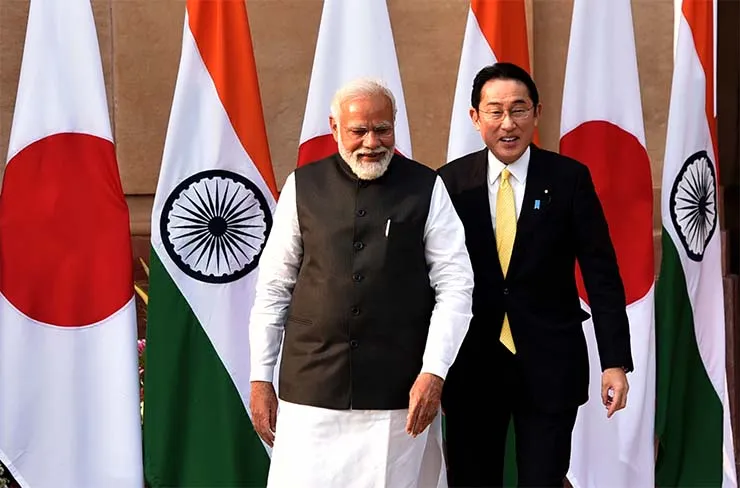
New Delhi – Prime Minister Narendra Modi held wide-ranging, extensive talks with his Japanese counterpart Fumio Kishida on March 20. Both leaders agreed to expand India-Japan strategic partnership for a peaceful, stable and prosperous post-Covid world.
The Japanese prime minister who arrived in Delhi today to ramp up bilateral ties in a range of areas and explore convergence between India’s presidency of G20 and Japan’s presidency of the G7 to address various global problems.
After the bilateral talks, PM Modi said it is the best opportunity to work together on priorities of both sides for global good. Addressing the media, he referred to India’s presidency of the G20 and Japan chairing the G7 grouping, and thanked PM Kishida for the invite to G7 Leaders’ Summit.
“Today, Japanese Prime Minister Fumio Kishida invited me to the G7 Leaders’ Summit which will be held in Hiroshima in May. I thank him for this,” Modi said. The Indian leader said that he briefed Prime Minister Kishida about the priorities of the Indian presidency of G20.
“In September this year, I will again get the opportunity to welcome PM Fumio Kishida to India for the G20 Leaders’ Summit,” he said. Prime Minister stressed that the India-Japan Special strategic and global partnership is based on democratic principles and respect for international rule of law and that it is important for the Indo-Pacific as well.
“Japan will continue to invest in India’s development story which will not only benefit New Delhi but Tokyo as well,” said Japanese Prime Minister Kishida during his remark.
Prime Minister Kishida also unveiled his plan “for a free and open Indo-Pacific” and said that Modi has been invited to the G7 summit in May and that he has agreed to participate in it. The exact details of Kishida’s vision of a free Indo-Pacific has not been revealed yet.
Before his visit to India, Kishida on March 19 said the aim of his visit would be to further deepen the “special strategic and global partnership” between the two countries. “This year, Japan holds the presidency of the G7, while India chairs the G20. I intend to engage in a thoroughgoing exchange of views with Prime Minister Modi on the question of what role Japan and India should play within the international community,” he said.
“Alongside that, with regard to bilateral Japan-India relations, I want to confirm the further deepening of the special strategic and global partnership between India and Japan,” Kishida said. “I will also deliver an address in India on a new plan for a Free and Open Indo-Pacific. I will clearly lay out my thinking regarding the role that a Free and Open Indo-Pacific will play at this historic turning point,” he added.
During his visit to India in March last year, Kishida announced an investment target of five trillion Yen (Rs 3,20,000 crore) in India over the next five years.








